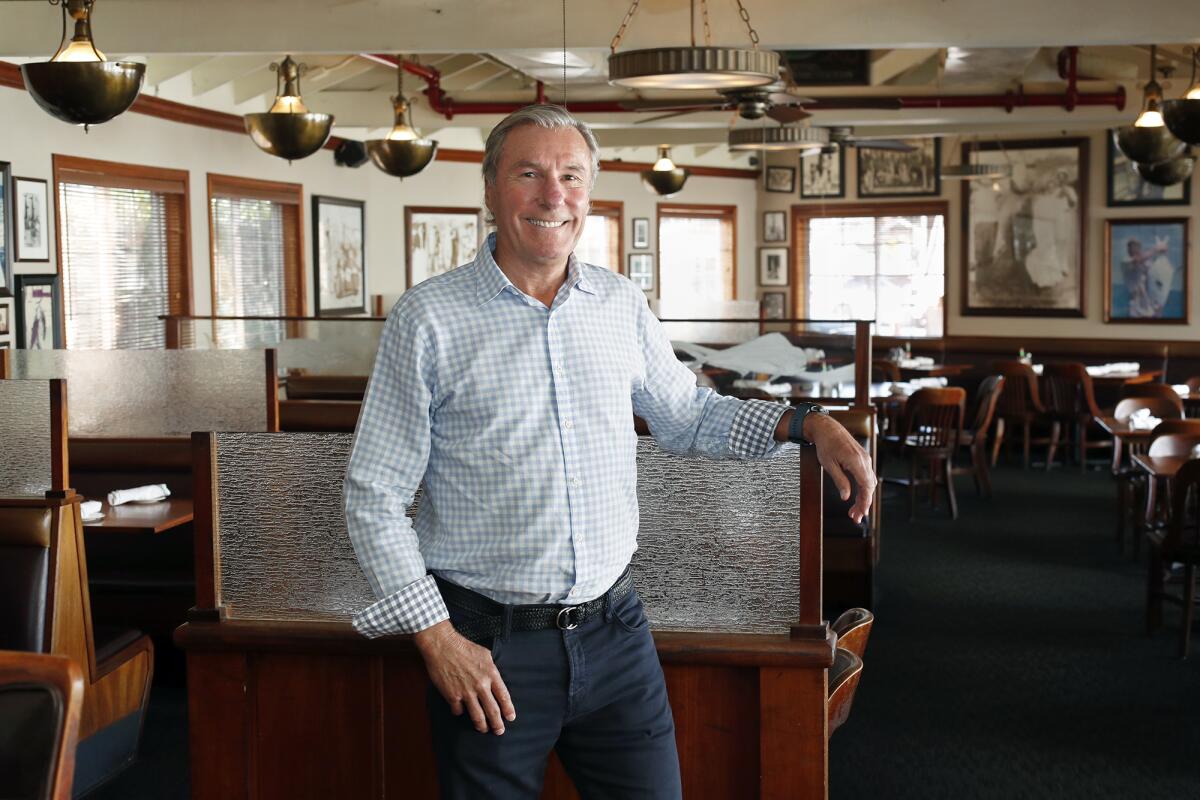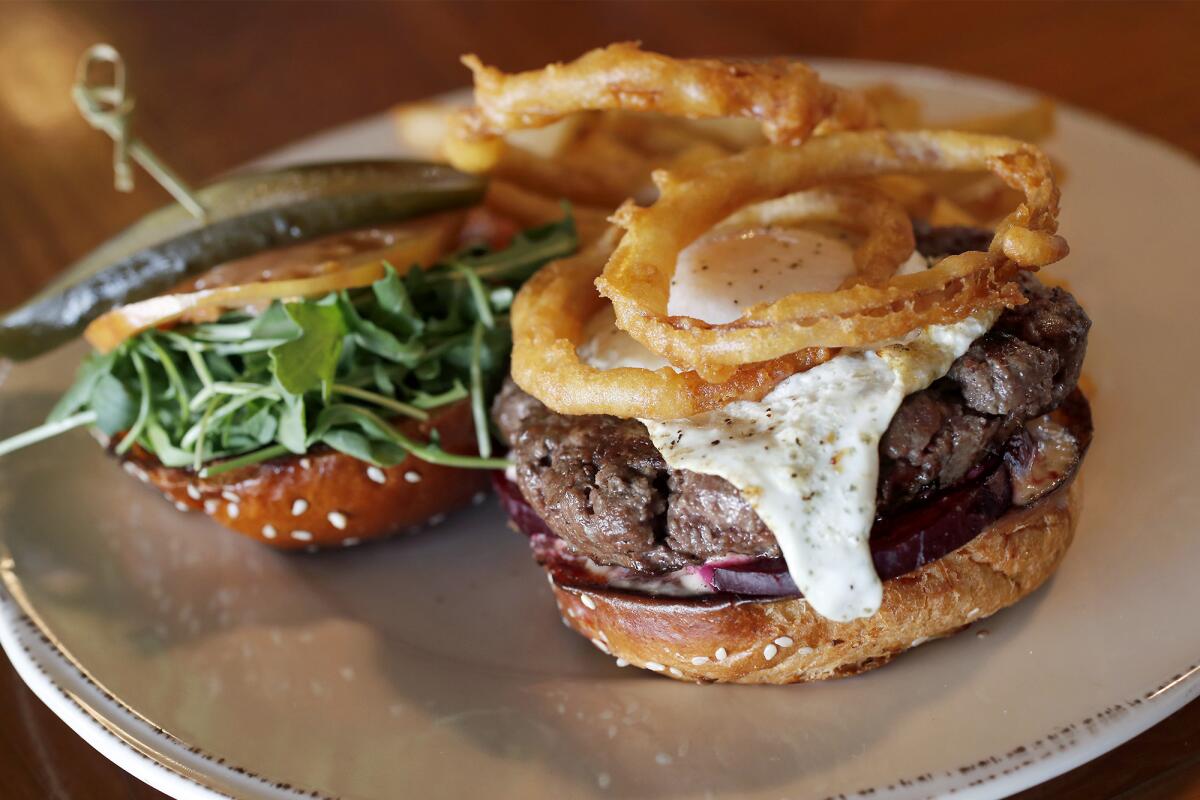As wildfires rage in Australia, business owners in Newport and Costa Mesa rally support for their homeland

As fires rip through their homeland, two Australian business owners in Newport Beach and Costa Mesa are rallying to fight the fires from afar — with the help of their local communities.
Rick Staunton, co-owner of Bluewater Grill on Newport Beach’s Lido Peninsula, is donating $1 for every Bluewater Burger sold through February to the World Wildlife Fund’s Australian Wildlife and Nature Recovery Fund.
The burger was one of Staunton’s favorite meals as a boy — a thick slab of meat topped with a fried egg and a beet slice — and is the menu’s most “quintessentially Australian” item, he said.
Ten minutes up the road in Costa Mesa, Outpost Kitchen held a two-day fundraiser two weeks ago and donated 100% of its coffee sales to the Wildlife Information, Rescue and Education Service, or WIRES, an Australian nonprofit dedicated to rescuing and saving wild animals during severe weather situations. Owner Jay Lewis said the effort raised nearly $1,500.
“I was super pleased with the outcome and the support from the community,” Lewis said.
Both business owners hail from New South Wales, the state on Australia’s eastern coast that has been hit the hardest by the wildfires. Of the 29 deaths reported across the country, 21 have been in New South Wales, according to fire officials.
More than 12 million acres have burned in the state since the firestorms broke out — accounting for nearly half the land charred nationwide.

On a trip to Sydney in November, Staunton visited Bondi Beach, where it was “difficult to see from one end to another” because of the haze.
“You wake up in the morning and you smell smoke,” he recalled.
Back home in Southern California over the holidays, Staunton watched as news reports showed the fires spreading across New South Wales and erupting throughout the five other Australian states.
Staunton and Lewis have kept in touch with friends who were forced out of their homes and, in some cases, moved closer to the coast to escape the fires. They’ve kept up correspondence as their friends either moved back home or began to pick up the pieces after losing their properties.
“Obviously it’s damaging when you’re in a place full of fire you can’t control and it burns animals and housing and towns,” Lewis said. “But it’s almost just as damaging as to what comes after — how do we rebuild and how do we start a life … over again when people lose everything?”
In the fall, Staunton turned on the TV to find footage of fire spreading across Sydney’s North Shore, just a few miles from where he had attended school at Barker College.
“Then they called in one of those painted bombers and in one swoop it eliminated the whole fire,” Staunton said, demonstrating with a sweep of his arm. “Yeah, it was pretty dramatic to watch.”
Though he considers himself more of a city dweller, Staunton grew up in a northern suburb of Sydney, visiting his friends’ farms and riding their horses through the verdant countryside — much of which is now charred black.
The burned scenery brings to mind a fire Staunton narrowly escaped nearly 30 years ago: the 1993 blaze in Laguna Beach.
He had just left for a trip to Australia when the fire began. His wife, who had stayed in Laguna an extra day, called to tell him “the mountain is on fire.” The Emerald Bay neighborhood, just north of Staunton’s home, was aflame.
Staunton turned on his television to see footage from a helicopter hovering over where he lived.
“I looked at that and said, ‘That’s it. We’re done,’” he said.
His house remained standing, though, unaffected by the flames that consumed homes just two doors over.
The 1993 fire became another notch in his disaster experience belt — right beside those from the Australian bushfires he lived through growing up, the blaze that forced him to evacuate his home in Rancho Santa Fe, and conflagrations and ensuing mudslides that disrupted the opening of his restaurant in Santa Barbara.
“California — it’s fires and mudslides,” Staunton said.
Despite the natural disasters that followed them from their native country to their adopted turf in Orange County, Lewis and Staunton acknowledged the two places’ more pleasant similarities.
“Outdoors, beach, surf, barbecues, casual, they’re similar lifestyles,” Staunton said.
He and Lewis said their restaurants reflect those similarities.
“Australian lifestyle is all about celebrating outdoors and what you have around you,” Lewis said. “I feel like the cuisine is very fresh and like it’s very much about the land. That’s why I did an organic restaurant.”
Staunton likened Bluewater Grill to the restaurants on Sydney’s eastern shore.
“Our entire menu is pretty reminiscent of seafood in Australia,” he said.
Now, both men hope their adopted communities will join them in extending a helping hand across the Pacific.
All the latest on Orange County from Orange County.
Get our free TimesOC newsletter.
You may occasionally receive promotional content from the Daily Pilot.




